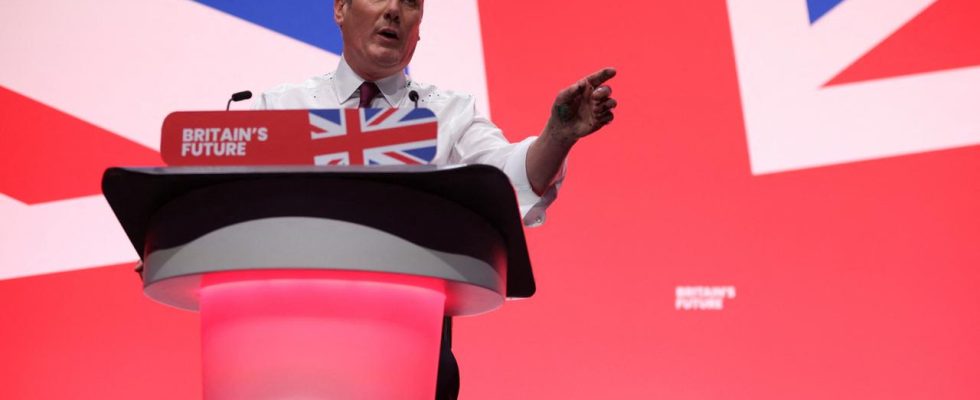At its party conference, the Labor Party presented itself as an alternative to the Tories – more orderly and capable of taking action than the Sunak government. Opposition leader Starmer is seeking proximity to the economy – and to the EU.
The atmosphere is really good in this small room in the basement of the conference center. Labor MPs from Scotland, local politicians and supporters meet here. The room is full.
When Michael Shanks enters the room there is thunderous applause. There are cheers and standing ovations. The 35-year-old politician has just won a by-election in a district near Glasgow in Scotland. It is a victory that gives the entire party a boost. Labor can finally win again in Scotland – where Labor used to be strong until the Scottish National Party (SNP) pushed everyone else out.
The SNP has just gone through several scandals and the party is in turmoil. Of the 59 Scottish MPs in the British House of Commons, two now belong to Labor and there is great hope that there will soon be significantly more again.
This is significant because Labor will need to win constituencies in Scotland at the next election in 2024 if they want to gain a majority in the House of Commons in London. For a long time the Scottish National Party seemed invincible. This is different now.
Tories and Sunak under pressure
But the elections are far from won. Labor is positioning itself at this conference to try to embody the model of a party that is simply capable of governing. “We must end the perpetual decline caused by the Tories and begin a decade of renewal,” said party leader Keir Starmer in his speech at the party conference in Liverpool.
No frills, no shrill tones, no arrogance – but solid government work. Starmer profiles himself as an alternative to the volatile and sometimes populist policies of the conservative government, which cannot achieve its goals in many areas.
Rishi Sunak’s cabinet has just had to cancel one of the largest infrastructure projects in the United Kingdom, a high-speed rail line to the north. The government is making no progress in reforming the NHS health service. And Sunak also cannot deliver on his promise to reduce the number of refugees coming in boats across the English Channel.
Economic Interests more in focus
Labor wants to put the economy at the center of the election campaign. Growth should be stimulated. Prosperity for all is the designated goal: “Some old ideas aren’t so bad. Where there are jobs, where land is cheap, we will drive the shovels into the ground, set up cranes and build new cities,” said Starmer. He also promised that homes should become more affordable for families again.
The party leader invited representatives from around 200 companies to the party conference. At an event he offered the managers a partnership. With Labor they would also move into government. These are new tones that were unthinkable under Starmer’s predecessor at the head of the party, Jeremy Corbyn.
Labor’s conference was not without incident: a man stormed onto the stage during Keir Starmer’s speech and threw glitter dust at the opposition leader.
‘Ready to rebuild Britain’
Rachel Reeves, who will become Chancellor of the Exchequer if Labor wins the election, announced a raft of concrete measures: “We are ready to deliver, ready to lead and ready to rebuild Britain,” she said in Liverpool. It is a drastic rhetoric that Labor is using. But in doing so, the party meets the feelings of many people in view of long waiting times in the health sector, child poverty, broken roads and rotten school buildings.
Reeves promised to push forward infrastructure projects with simplified approval processes, eliminate tax breaks for the rich and pursue sound financial policies. In addition, the financial authority OBR is to be strengthened. When former Prime Minister Liz Truss cut taxes without defining counter-financing and the markets crashed, she explicitly ignored the warnings of this authority.
Labor also announced that it would strengthen the regions, for example through the massive expansion of renewable energies. This is intended to create jobs, and Starmer also promised cheaper energy. The topic of Brexit, however, played no role. Labor does not want to reverse the withdrawal from the European Union, but does want to improve relations with the EU. According to the calculations at the top, a new Brexit debate would cause massive damage to the party.
However, the challenge of fulfilling even a fraction of these promises is enormous. Above all, this program also tests the unity of the party. At the moment, Labor is still united in its anticipation of taking power. After 13 years of Conservative government, the common goal is to end the Tories’ oft-proclaimed “chaos”.
Labor on course for government
The question in the meeting rooms in Liverpool is no longer about whether and how Labor will come into government. The question that many people ask themselves, however, is: “How do we govern?” In the numerous meetings of the various groups at the party conference in Liverpool, demands were made to the party leadership.
In their group, the local Labor politicians emphasized the importance of the regions and want more independence in economic development, education and infrastructure projects. In the boardroom next door, people were talking about how tax evasion can be better prevented and what laws can finally be introduced once Labor has forced the Tories out of office.
On the far left, for example, organized in the “Socialist Campaign Group,” many are disappointed that left-wing positions are no longer heard so loudly in the party. But that seems to be the price they have to pay for party unity. Rail union boss Mick Lynch spoke here. To thunderous applause, he summed up the mood in the room quite well: The main thing is to finally end the Tories’ reign. That may be enough for the coming months until the elections.

